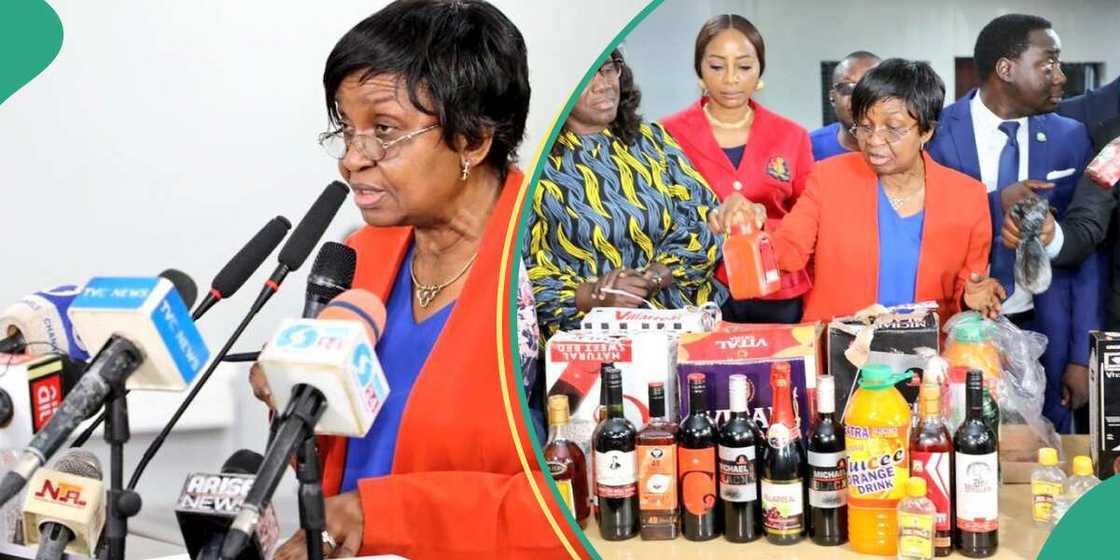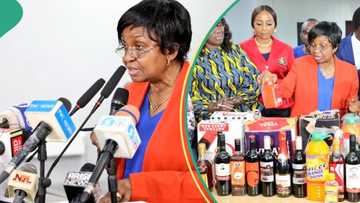“Don't Fall Victim”: NAFDAC Reveals Targets, Shows Easy Steps Nigerians Can Spot Fake Products
- NAFDAC has provided insight into how Nigerians can spot the difference between fake and original products
- In a message to Nigerians, NAFDAC listed various methods, including fake products via packaging, seals, pricing, and barcodes
- Consumers were also asked to be vigilance to avoid health risks from consuming counterfeit alcohol
Legit.ng journalist Dave Ibemere has over a decade of experience covering Tech, Energy, Stocks, Investments, and the Economy.
The National Agency for Food and Drug Administration and Control (NAFDAC) has enlightened Nigerians on steps to verify the original products.
The agency has also unveiled a list of circulating adulterated wines and drinks that Nigerians should watch out for.

Source: Getty Images
List of adulterated products Nigerians should watch out for
Some of the most adulterated products NAFDAC has identified include:
PAY ATTENTION: Share your outstanding story with our editors! Please reach us through info@corp.legit.ng!
Different kinds of wine from a wide variety of brands ranging from Seaman Schnapps, Henessy, Four Cousins, Carlo Rossi, Jenney, Chelsea London Dry Gin, Schnapp Dry Gin, McDowells, Black Labels, Gordons, Martell, Campari, Smirnoff Ice, Eva Non-Alcoholic Drink, Evra Non-Alcoholic Drink, Cartel, and others.
There is also date revalidation for expired products like Peak milk, Powdered milk, Ketchups, Yoghurt, Coca-Cola products, and packaging of fake and substandard products, which are later sold to unsuspecting members of the public for consumption.
How to identify adulterated products:
Speaking on how Nigerians can identify fake products, Moji Adeyeye, NAFDAC's director-general, urged Nigerians to remain vigilant.
She also has tasked consumers to scrutinise branded drinks and read labels to distinguish them from counterfeits before consuming them.
Her words:
“If a product is being sold well below its normal price, or doesn’t seem to include normal taxes on liquors, then it is probably fake. Don't fall victim.

Read also
“NAFDAC is dull”: Nigerians knock regulator over discovery of fake wines, soft drinks, others in Aba
"Check for poor quality packaging, spelling mistakes and unusually shaped bottles.
"Look for the contact information and address of the manufacturer. If it is missing, the alcohol is fake.
“Inspect the seal on the bottle. If the seal is broken or damaged, then the contents might have been interfered with and are not safe to drink. Check for fake bar codes. If you have an app on your mobile that scans bar codes, scan it and see if it’s listed as the correct product and beware of bad smells! If it smells like paint str*pper or nail polish remover, then it probably is!”
She also urged Nigerians to call NAFDAC to report using this link or send a free SMS on the products to 20543.
“Six people already dead”: NAFDAC raises alarm over killer cough medicine
Legit.ng earlier reported that NAFDAC warned Nigerians about a killer cough syrup known as NATURCOLD in Nigeria.
NAFDAC’s DG disclosed this on Wednesday, April 26, 2023. She revealed the medicines had already claimed the lives of six children in Cameroon.
The NAFDAC DG said the cough syrup was not in the agency’s database and asked importers, distributors, retailers, and consumers to be cautious and vigilant in the supply chain.
PAY ATTENTION: Donate to Legit Charity on Patreon. Your support matters!
Source: Legit.ng




